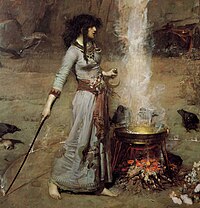| Part of a series on |
| Witchcraft |
|---|
 |
The views of witchcraft in North America have evolved through an interlinking history of cultural beliefs and interactions. These forces contribute to complex and evolving views of witchcraft. Today, North America hosts a diverse array of beliefs about witchcraft.[1][2]
Indigenous communities such as the Cherokee,[3] Hopi,[4] the Navajo[5] among others,[6] included in their folklore and beliefs malevolent figures who could harm their communities, often resulting in severe punishments, including death.[7] These communities also recognized the role of medicine people as healers and protectors against these malevolent forces.[citation needed]
The term witchcraft arrived with European colonists, along with European views on witchcraft.[1] This term would be adopted by many Indigenous communities for those beliefs about harmful supernatural powers. In colonial America and the United States, views of witchcraft were further shaped by European colonists. The infamous Salem witch trials in Massachusetts, along with other witch hunts in places like Maryland and Pennsylvania, exemplified European and Christian fear and hysteria surrounding accusations of witchcraft. These trials led to the execution of numerous individuals accused of practicing witchcraft. Despite changes in laws and perspectives over time, accusations of witchcraft persisted into the 19th century in some regions, such as Tennessee, where prosecutions occurred as late as 1833.
The influences on Witchcraft in Latin America impacted North American views both directly and indirectly, including the diaspora of African witchcraft beliefs through the slave trade[8][9][2] and suppressed Indigenous cultures adopting the term for their own cultural practices.[10] Neopagan witchcraft practices such as Wicca then emerged in the mid-20th century.[1][2]
- ^ a b c Breslaw, E. G. (2011). "Witchcraft in Early North America". Journal of American History. 98 (2): 504. doi:10.1093/jahist/jar254.
- ^ a b c Witchcraft and Magic: Contemporary North America; Edited by HELEN A. BERGER; Copyright: 2005; Published by: University of Pennsylvania Press; https://www.jstor.org/stable/j.ctt3fh7kf
- ^ Kilpatrick, Alan (1998). The Night Has a Naked Soul - Witchcraft and Sorcery Among the Western Cherokee. Syracuse University Press.
- ^ Geertz, Armin W. (Summer 2011). "Hopi Indian Witchcraft and Healing: On Good, Evil, and Gossip". American Indian Quarterly. 35 (3): 372–393. doi:10.1353/aiq.2011.a447052. ISSN 0095-182X. OCLC 659388380. PMID 22069814.
To the Hopis, witches or evil-hearted persons deliberately try to destroy social harmony by sowing discontent, doubt, and criticism through evil gossip as well as by actively combating medicine men. ... Admitting [he practiced witchcraft] could cost him his life and occult power
- ^ Perrone, Bobette; Stockel, H. Henrietta; Krueger, Victoria (1993). Medicine women, curanderas, and women doctors. University of Oklahoma Press. p. 189. ISBN 978-0-8061-2512-1. Archived from the original on 23 April 2017. Retrieved 8 October 2010.
- ^ Simmons, Marc (1980). Witchcraft in the Southwest: Spanish and Indian Supernaturalism on the Rio Grande. University of Nebraska Press. ISBN 978-0-8032-9116-4.
- ^ Wallace, Dale Lancaster (January 2015). "Rethinking religion, magic and witchcraft in South Africa: From colonial coherence to postcolonial conundrum". Journal for the Study of Religion. 28 (1): 23–51. Retrieved 2023-09-15 – via Acaemdia.edu.
- ^ Bachmann, Judith (2021). "African Witchcraft and Religion among the Yoruba: Translation as Demarcation Practice within a Global Religious History". Method & Theory in the Study of Religion. 33 (3–4): 381–409. doi:10.1163/15700682-12341522. S2CID 240055921.
- ^ Silverblatt, I. (1983). "The evolution of witchcraft and the meaning of healing in colonial Andean society". Culture, Medicine and Psychiatry. 7 (4): 413–427. doi:10.1007/BF00052240. PMID 6362989. S2CID 23596915.